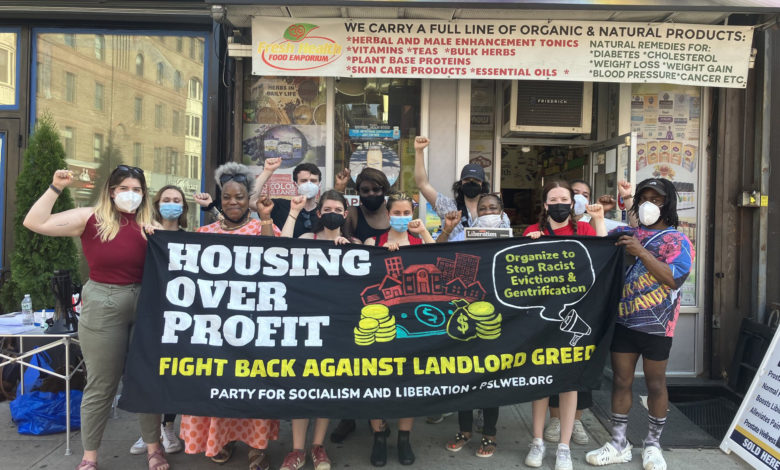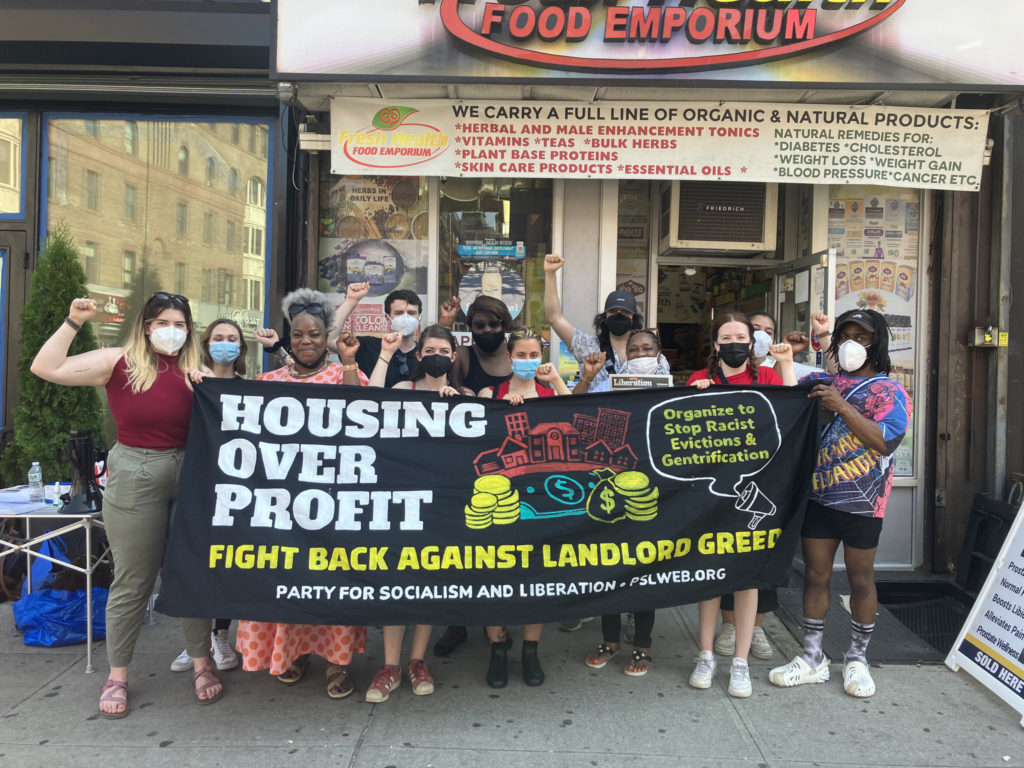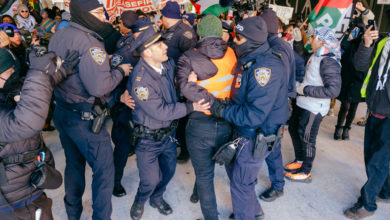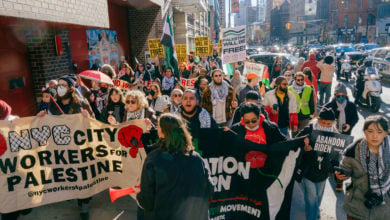
On May 22, tenants and organizers gathered for a speakout at the intersection of Nostrand Ave. and Fulton St. in the Crown Heights neighborhood of Brooklyn to draw attention to New York’s housing crisis, and urge all tenants to fight back by uniting against corrupt and negligent landlords. The action was organized by the Party for Socialism and Liberation and attended by organizations such as the Audre Lorde Project, Brooklyn Eviction Defense, and East New York Community Land Trust.
As the city continues to struggle through the COVID-19 pandemic, tenants in non-regulated apartments are facing massive rent increases with rents reaching record highs. At the same time, New York City’s mayor-appointed Rent Guidelines Board has proposed rent increases of up to 6% for the city’s 2.4 rent-stabilized tenants. The rent increase has been proposed at a time when the city is already seeing mass evictions.
“For a lot of people, 6% is the difference between being out on the streets or having a roof over their heads,” said Natalia Marques, an organizer with the PSL. “Six percent is life or death for a lot of us. Did 2.4 million rent stabilized tenants vote for a rent increase? No. You know who voted for a rent increase? Nine unelected people [in the Rent Guidelines Board]. This is not democracy!”
Right to Counsel
New York City recently implemented a Right to Counsel program, which in theory guarantees all tenants below a certain income threshold access to an attorney when facing eviction. But the current Right to Counsel program only applies to tenants in New York City, leaving tenants in the rest of the state without help. And the mass of evictions has overflowed the capacity of housing attorneys, meaning legal services organizations have been unable to take on all of the new eviction cases. The administrators of the court system have the power to slow down the process to ensure all tenants receive the legal services they are entitled to, but the courts have largely continued to push through cases at a breakneck pace.
“Right now judges are hearing two cases every 15 minutes,” said Fidele Albert from the Flatbush Tenant Coalition, referring to the massive overflow of eviction cases in New York City housing court. “We demand the Office of Court Administration should slow down the cases until all tenants obtain a lawyer. We also demand statewide Right to Counsel.”
Tenants demand repairs and end to landlord harassment
Tenants drew attention to landlord neglect when it came to repairs, as well as landlord harassment — issues made even more stark by the two-year pandemic.
“It doesn’t matter if it’s rent stabilized or not, we should still have repairs, we should still have a safe place to live,” demanded Chauvet Bishop, an organizer with the Audre Lorde Project and a tenant organizer in Crown Heights. “We want to make sure that our repairs are being done and that we’re not having Band-Aid repairs. In our building, they would mark on the computer that they made the repairs, but no one ever came to the apartment. Windows are falling apart. People have fallen in the stairs. There’s no elevator so you have to use the stairs, but there are elders in the building.”
Other tenants at the rally echoed Bishop’s landlord complaints.

“My situation is that I have a lot of issues in the building,” said Nicole Dyer, a long-time resident of the Flatbush neighborhood in Brooklyn. “They’re supposed to be making repairs. It’s about three years going back and forth with them and they’re not doing nothing … And they’re adding it to the rent, adding on different fees … Our landlord is always trying to mess with us. The repairs that they’re doing in that building are a joke.”
Partly in response to landlord harassment, the tenant movement throughout the state is advocating for Good Cause Eviction protections, which would prevent landlords from evicting tenants except for “good cause,” such as failure to pay rent, and would provide certain protections to tenants against unreasonable rent increases.
Under current law, landlords can refuse to renew the lease of non-rent-stabilized tenants for any reason. In practice, this opens the door to landlord harassment and retaliation. Tenants who fight for their rights often find that their landlord suddenly refuses to renew their lease and moves to evict them from their home.
“In my case, I got an eviction notice after I fought back against harassment,” explained Albert. “My electricity was turned off for eight months. But they turned back on the lights. I won the fight. But right after that I got an eviction notice, because my apartment is not rent stabilized. Good Cause can help protect us from these evictions.”
Organizers call for unity of those housed and unhoused
While tenants in apartments face rent hikes, harassment and poor conditions, New York City Mayor Eric Adams has initiated a massive program of harassment against the city’s houseless population. The city has forced houseless New Yorkers out of hundreds of encampments throughout the city.
“These sweeps are actually very effective in their real goal: They fracture the working class,” noted Holden Taylor, an organizer with Brooklyn Eviction Defense. “They create a division between the housed working class and the unhoused working class, and they terrify tenants into paying their rent because they don’t want to become homeless. We reject that distinction! Tenancy includes all of us who do not control our housing. Evictions of both housed and unhoused tenants can only be stopped through a unity of both housed and unhoused tenants.”
All speakers emphasized that the most important tool for tenants was organization. All agreed that, ultimately, politicians would not solve the problems tenants face. Instead, they insisted, tenants — housed and unhoused — must bind together to fight back against corrupt landlords and the politicians who support them.
“Eric Adams ain’t saving anybody. The democrats ain’t saving anybody,” said Joe Mendoza of the PSL. “All we have is each other. That’s the true source of our power. Sixty-eight percent of New Yorkers are tenants — renters. As individuals we don’t have a chance. But as tenants, united, working toward the same goal, building tenant associations throughout the city, they don’t have a choice but to listen to us.”





